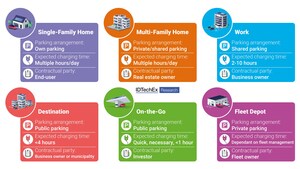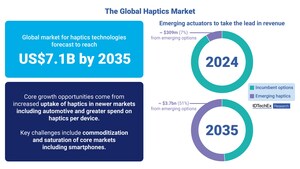BOSTON, Feb. 5, 2019 /PRNewswire/ -- We move to cities and do internet shopping: that destroys the market for private cars and boosts demand for buses and delivery trucks. Monster Class 8 trucks are top polluters on US highways, all powering a boom in energy storage in buses and trucks. The new IDTechEx Research report, "Energy Storage for Electric Buses and Trucks 2019-2029" analyses the similar requirements. Robust growth is ongoing - China is completing urban bus electrification, city delivery truck electrification is well under way but electrifying monster inter-city trucks, urban buses outside China and 1.5 million school buses has scarcely begun. The world has ten times as many trucks as buses. The report looks particularly at pure electric versions, the end game, but the much smaller energy storage for those hybrids losing market share is also covered.
Yes, it finds that lithium-ion batteries will continue to dominate but appraise ongoing safety and supply risks not least because of rapid redesign of every part. Uniquely, the report surfaces the two radical advances in supercapacitors which will give them the energy density that lithium-ion batteries had in 2012. That 100 Wh/kg is very significant given the much better cycle life, reliability, safety and power density of supercapacitors. Learn how fuel cells have won the first round in the largest trucks and how all these technologies combine and improve over the coming decade, as clarified in new infograms, technology roadmaps and detailed forecasts for many types of bus and truck.
As usual, the research is carried out by globally travelled multi-lingual IDTechEx analysts at PhD level who interview in local languages. Updating is continuous so you get the latest, but in any case this report is entirely written in late 2018-2019 using inputs from research and industry leaders, privileged databases and other sources, including IDTechEx conferences on the subject. IDTechEx analysts are recognised as global experts themselves: they are part of the community so they have the inside track. They do not evangelise: indeed they reveal six ways the capacity and cost of the energy storage will be reduced in later years while retaining vehicle performance.
The report starts with a detailed Executive Summary and Conclusions for those in a hurry needing the essence of the findings and predictions, the bad news and good. The dynamics of the industry is clarified such as when vehicle technology achieves the killer blow of lower up front price of ever larger pure electric buses and trucks as measured in kWh. Typical battery and supercapacitor parameters are compared including for the versions emerging in robot micro-buses. See the statistics, even for school buses, and the forecasts of battery and supercapacitor energy density improvement, penetration of different lithium-ion chemistries into the many vehicle sub-sectors and so on.
The Introduction then looks at the fundamentals of EVs, emissions, powertrain options by cost over the years and progress of the battle between fuel cell and battery large trucks, embracing costs, performance relativities and more. Chapter 3 gives the detail on actual buses and their energy storage and chapter 4 does the same for trucks. Chapter 5 is a deep dive into lithium-ion batteries but this is no party line or academic treatise. We explain why the planned massive scale up while changing anode, cathode, electrolyte and format, or most of these, will lead to more failures and interruptions to production. Learn why each is change is happening.
Chapter 6 of "Energy Storage for Electric Buses and Trucks 2019-2029" will be a surprise as it reveals that there are now two credible routes in research to supercapacitors with early Li-ion energy density. Will an urban bus with no battery charge only at depot and take only minutes to do so? We have done the interviews and calculations to find out. Chapter 7 analyses fuel cells and here, as elsewhere in the report, the subject is brought alive by detail of many actual fuel cell vehicles. Chapter 8 compares technical and commercial details of 140 sources of lithium-ion batteries.
Contact the IDTechEx Research team at [email protected] to find out more, or visit www.IDTechEx.com/esbuses.
IDTechEx guides your strategic business decisions through its Research, Consultancy Events services, helping you profit from emerging technologies. Find out more at www.IDTechEx.com.
Media Contact:
Charlotte Martin
Marketing & Research Co-ordinator
[email protected]
+44(0)1223-812300
SOURCE IDTechEX
Related Links
WANT YOUR COMPANY'S NEWS FEATURED ON PRNEWSWIRE.COM?
Newsrooms &
Influencers
Digital Media
Outlets
Journalists
Opted In






Share this article